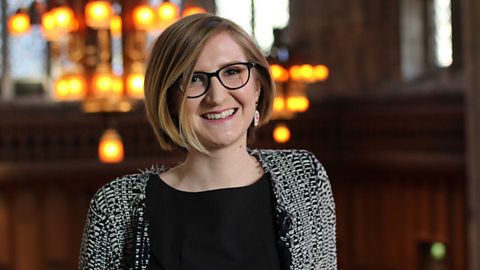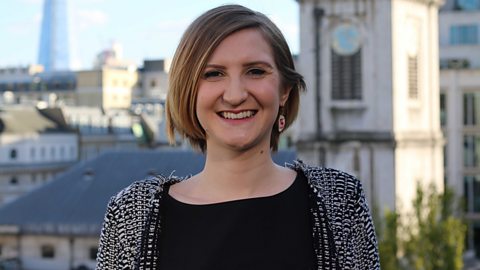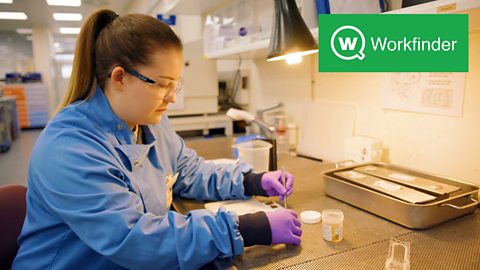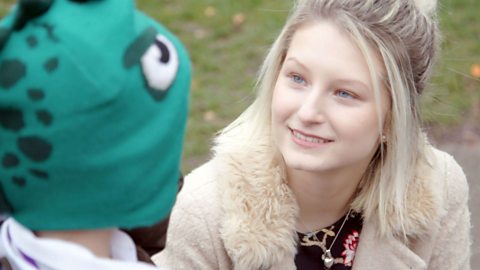Meet Bryony. She's 26 and from Hampshire. Find out about her job as a coroner's officer. Part of our Bitesize world of work series.

I always wanted to speak to people and help people and provide a social service.
How would you describe your job?
We investigate deaths on the behalf of the coroner and answer specific questions about the identity of somebody who has died. Under circumstances where a death occurs unnaturally or the identity of a person is unknown, the incident would be referred to a coroner.
What are your day-to-day tasks?
We receive referrals from either hospitals or the police. We answer any questions the family might have, we manage inquest hearings and sometimes carry out visual identifications with families.

What skills do you use for your work?
I need to have good listening, speaking and writing skills and be able to explain things in different forms of correspondence.
I have to be able to understand medical reports as we read a lot of them, for example when researching different medical conditions.
Time management and dealing with things as efficiently as you can to reduce the stress to families is vital. This helps to manage the expectations of the families.

What subjects do you draw on from schools?
I have drawn on Religious Studies which has helped my understanding of people’s cultures and backgrounds and how that affects their interaction with our service.
I also draw on Sociology, Cultural Studies and similar subjects I did at college and university, because we deal with families at such a sensitive time. London is so diverse, and you are dealing with a lot of different cultures on a regular basis.

Top tips
If you don't know what you want to do, choose subjects that you love doing. There will always be something for you to do
Think about what you are good at too. Doing this helped open up a lot of choices for me.

Bryony is currently a coroner's officer for the City of London Corporation.
Coroners look into deaths from unnatural or unknown causes, or those that have happened suddenly or in prison, or police custody.
In England and Wales, each local authority has a coroner, a coroner's office and a Court.
Each coroner has an individual team of staff including coroner's officers and assistant coroners.
Bryony would need to complete a law degree and then practise as a qualified solicitor or lawyer for five years to work her way up to being an assistant coroner or coroner.
A coroner's officer investigates deaths on behalf of the coroner. A coroner investigates deaths where the causes are unexplained or the person’s identity is unknown.
What to expect if you want to be a coroner
- Coroner average salary: ÂŁ85,000 to ÂŁ115,000 per year
- Coroner typical working hours: 36 to 38 hours per week
What qualifications do you need to be a coroner?
You can get into this role by applying directly.
You'll usually start as an assistant coroner. To apply, you should be either:
- a qualified barrister or solicitor with at least five years' experience. This can be via a degree, where you will need at least three A-levels. Alternatives to A-levels include taking a T-level in Legal Services (England-only, from Sept 2023), which is equivalent to three A-levels. Check with your course provider which alternative qualifications they accept.
- a Fellow of the Chartered Institute of Legal Executives with at least five years' qualified experience.
Local authorities appoint coroners and assistant coroners with the consent of the Chief Coroner and the Lord Chancellor.
Sources: LMI for All, National Careers Service,
This information is a guide and is constantly changing. Please check the for the latest information and all the qualifications needed and the for more on T-levels.
You can find out more about becoming a coroner from the and the .
For careers advice in all parts of the UK visit: , , and .


Find work experience placements with Workfinder.
Tips and advice
Help with interviews, writing a CV and all things work experience related.


Halimah: apprentice paralegal. video
Halimah is an apprentice paralegal at a commercial law firm.

Transferable skills translator. video
Highlighting the soft skills that employers love.

Gemma: school administrator. video
Gemma works in a primary school as a school administrator, under a business administration apprenticeship.
